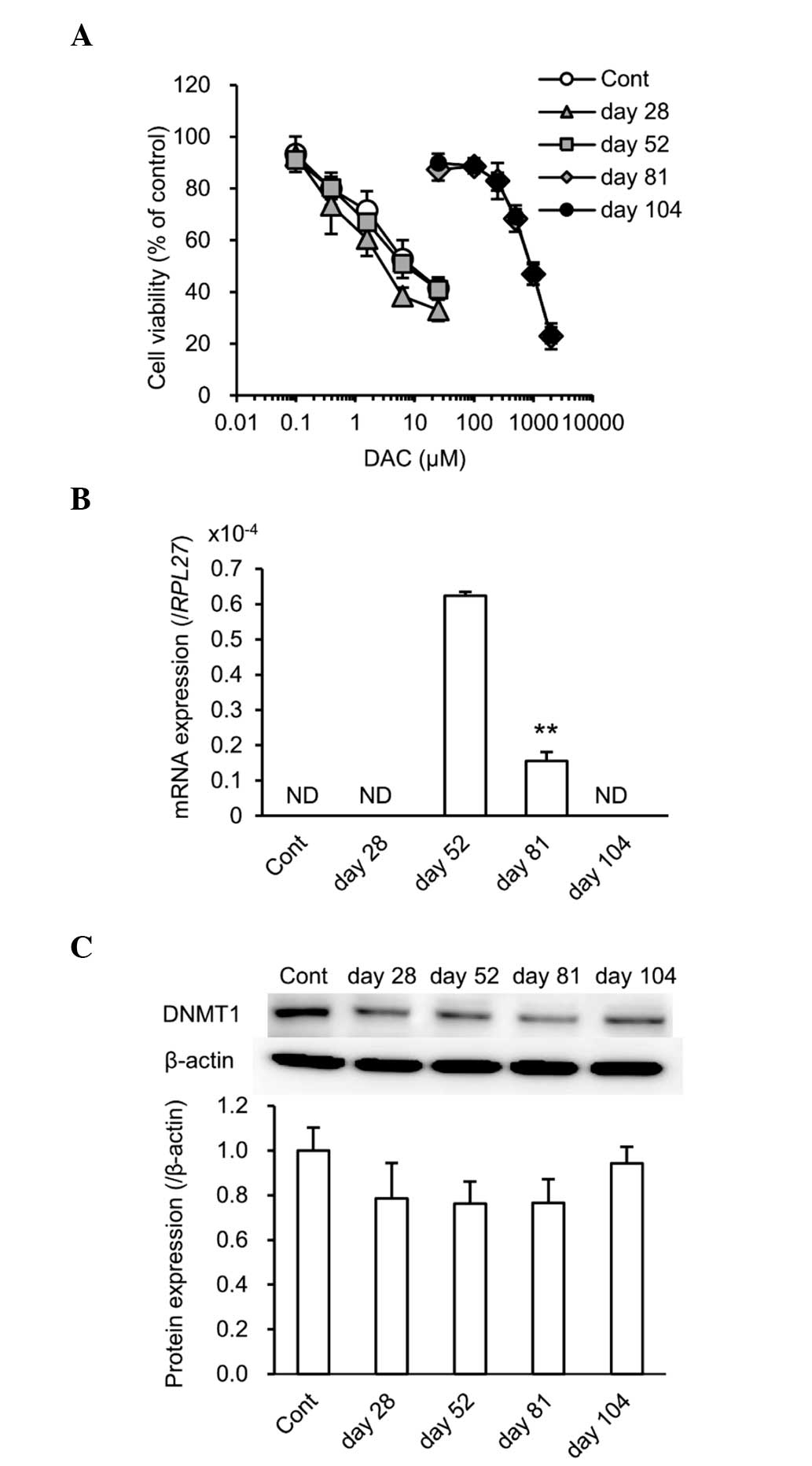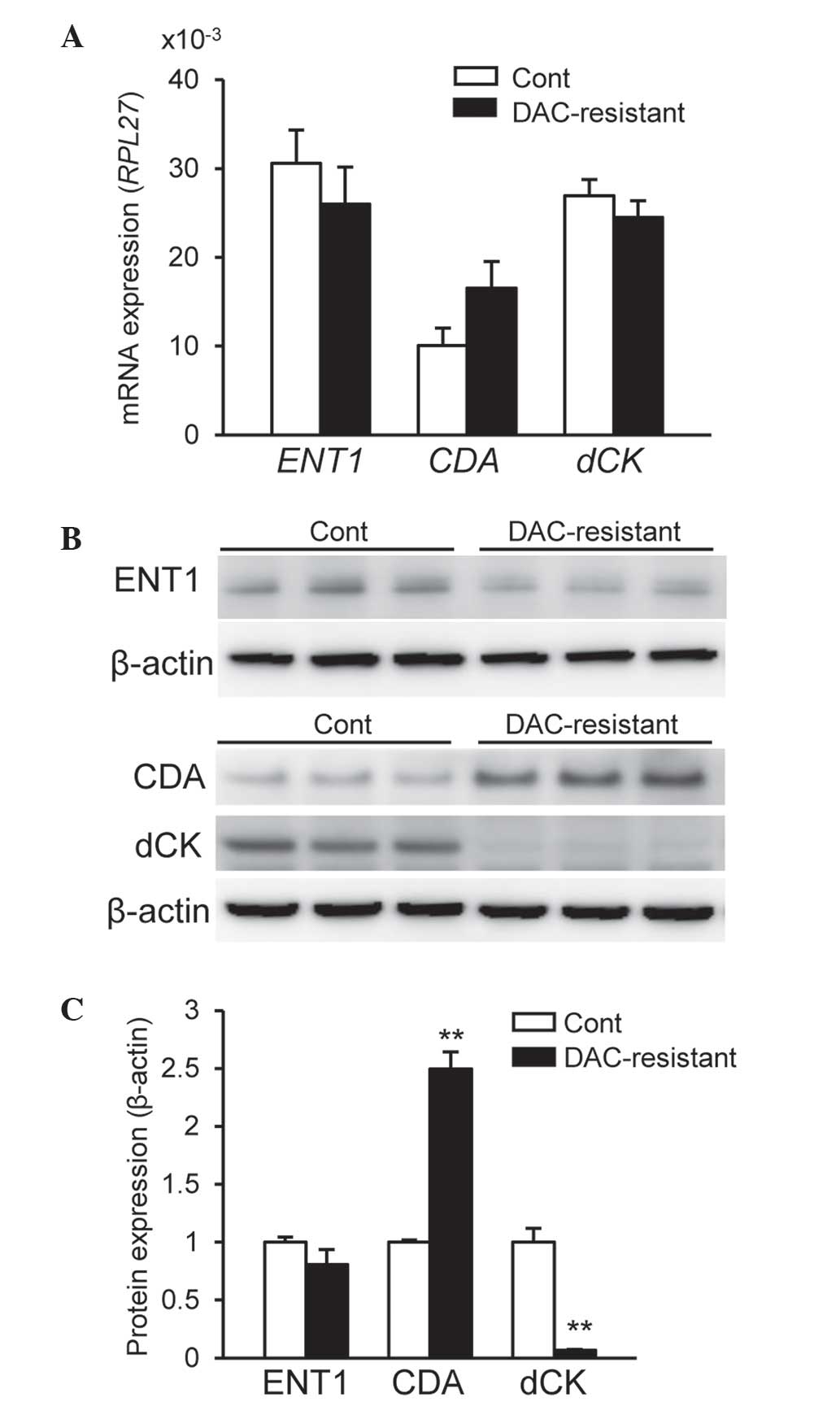|
1
|
Sarkar S, Horn G, Moulton K, et al: Cancer
development, progression, and therapy: An epigenetic overview. Int
J Mol Sci. 14:21087–21113. 2013. View Article : Google Scholar : PubMed/NCBI
|
|
2
|
Ishikawa T: Novel therapeutic strategies
using hypomethylating agents in the treatment of myelodysplastic
syndrome. Int J Clin Oncol. 19:10–15. 2014. View Article : Google Scholar : PubMed/NCBI
|
|
3
|
Foulks JM, Parnell KM, Nix RN, et al:
Epigenetic drug discovery: Targeting DNA methyltransferases. J
Biomol Screen. 17:2–17. 2012. View Article : Google Scholar : PubMed/NCBI
|
|
4
|
Christman JK: 5-Azacytidine and
5-aza-2′-deoxycytidine as inhibitors of DNA methylation:
Mechanistic studies and their implications for cancer therapy.
Oncogene. 21:5483–5495. 2002. View Article : Google Scholar : PubMed/NCBI
|
|
5
|
Pluchino KM, Hall MD, Goldsborough AS, et
al: Collateral sensitivity as a strategy against cancer multidrug
resistance. Drug Resist Updat. 15:98–105. 2012. View Article : Google Scholar : PubMed/NCBI
|
|
6
|
Stordal B, Pavlakis N and Davey R:
Oxaliplatin for the treatment of cisplatin-resistant cancer: A
systematic review. Cancer Treat Rev. 33:347–357. 2007. View Article : Google Scholar : PubMed/NCBI
|
|
7
|
Fedier A, Dedes KJ, Imesch P, et al: The
histone deacetylase inhibitors suberoylanilide hydroxamic
(Vorinostat) and valproic acid induce irreversible and
MDR1-independent resistance in human colon cancer cells. Int J
Oncol. 31:633–641. 2007.PubMed/NCBI
|
|
8
|
Dedes KJ, Dedes I, Imesch P, et al:
Acquired vorinostat resistance shows partial cross-resistance to
‘second-generation’ HDAC inhibitors and correlates with loss of
histone acetylation and apoptosis but not with altered HDAC and HAT
activities. Anticancer Drugs. 20:321–333. 2009. View Article : Google Scholar : PubMed/NCBI
|
|
9
|
Imesch P, Dedes KJ, Furlato M, Fink D and
Fedier A: MLH1 protects from resistance acquisition by the histone
deacetylase inhibitor trichostatin A in colon tumor cells. Int J
Oncol. 35:631–640. 2009.PubMed/NCBI
|
|
10
|
Qin T, Castoro R, El Ahdab S, Jelinek J,
Wang X, Si J, Shu J, He R, Zhang N, Chung W, Kantarjian HM and Issa
JP: Mechanisms of resistance to decitabine in the myelodysplastic
syndrome. PLoS One. 6:e233722011. View Article : Google Scholar : PubMed/NCBI
|
|
11
|
Qin T, Jelinek J, Si J, Shu J and Issa JP:
Mechanisms of resistance to 5-aza-2′-deoxycytidine in human cancer
cell lines. Blood. 113:659–667. 2009. View Article : Google Scholar : PubMed/NCBI
|
|
12
|
Sripayap P, Nagai T, Uesawa M, Kobayashi
H, Tsukahara T, Ohmine K, Muroi K and Ozawa K: Mechanisms of
resistance to azacitidine in human leukemia cell lines. Exp
Hematol. 42:294–306. 2014. View Article : Google Scholar : PubMed/NCBI
|
|
13
|
Mahfouz RZ, Jankowska A, Ebrahem Q, Gu X,
Visconte V, Tabarroki A, Terse P, Covey J, Chan K, Ling Y, Engelke
KJ, et al: Increased CDA expression/activity in males contributes
to decreased cytidine analog half-life and likely contributes to
worse outcomes with 5-azacytidine or decitabine therapy. Clin
Cancer Res. 19:938–948. 2013. View Article : Google Scholar : PubMed/NCBI
|
|
14
|
Damaraju VL, Mowles D, Yao S, Ng A, Young
JD, Cass CE and Tong Z: Role of human nucleoside transporters in
the uptake and cytotoxicity of azacitidine and decitabine.
Nucleosides Nucleotides Nucleic Acids. 31:236–255. 2012. View Article : Google Scholar : PubMed/NCBI
|
|
15
|
Hummel-Eisenbeiss J, Hascher A, Hals PA,
Sandvold ML, Müller-Tidow C, Lyko F and Rius M: The role of human
equilibrative nucleoside transporter 1 on the cellular transport of
the DNA methyltransferase inhibitors 5-azacytidine and CP-4200 in
human leukemia cells. Mol Pharmacol. 84:438–450. 2013. View Article : Google Scholar : PubMed/NCBI
|
|
16
|
Arimany-Nardi C, Errasti-Murugarren E,
Minuesa G, Martinez-Picado J, Gorboulev V, Koepsell H and
Pastor-Anglada M: Nucleoside transporters and human organic cation
transporter 1 determine the cellular handling of
DNA-methyltransferase inhibitors. Br J Pharmacol. 171:3868–3880.
2014. View Article : Google Scholar : PubMed/NCBI
|
|
17
|
Cowan LA, Talwar S and Yang AS: Will DNA
methylation inhibitors work in solid tumors? A review of the
clinical experience with azacitidine and decitabine in solid
tumors. Epigenomics. 2:71–86. 2010. View Article : Google Scholar : PubMed/NCBI
|
|
18
|
Azad N, Zahnow CA, Rudin CM and Baylin SB:
The future of epigenetic therapy in solid tumours - lessons from
the past. Nat Rev Clin Oncol. 10:256–266. 2013. View Article : Google Scholar : PubMed/NCBI
|
|
19
|
Flis S, Gnyszka A and Flis K: DNA
methyltransferase inhibitors improve the effect of chemotherapeutic
agents in SW48 and HT-29 colorectal cancer cells. PLoS One.
9:e923052014. View Article : Google Scholar : PubMed/NCBI
|
|
20
|
Ikehata M, Ogawa M, Yamada Y, Tanaka S,
Ueda K and Iwakawa S: Different effects of epigenetic modifiers on
the cytotoxicity induced by 5-fluorouracil, irinotecan or
oxaliplatin in colon cancer cells. Biol Pharm Bull. 37:67–73. 2014.
View Article : Google Scholar : PubMed/NCBI
|
|
21
|
Baylin SB and Ohm JE: Epigenetic gene
silencing in cancer - a mechanism for early oncogenic pathway
addiction? Nat Rev Cancer. 6:107–116. 2006. View Article : Google Scholar : PubMed/NCBI
|
|
22
|
Ahmed D, Eide PW, Eilertsen IA, Danielsen
SA, Eknæs M, Hektoen M, Lind GE and Lothe RA: Epigenetic and
genetic features of 24 colon cancer cell lines. Oncogenesis.
2:e712013. View Article : Google Scholar : PubMed/NCBI
|
|
23
|
Issa JP: CpG island methylator phenotype
in cancer. Nat Rev Cancer. 4:988–993. 2004. View Article : Google Scholar : PubMed/NCBI
|
|
24
|
Kakumoto M, Takara K, Sakaeda T,
Tanigawara Y, Kita T and Okumura K: MDR1-mediated interaction of
digoxin with antiarrhythmic or antianginal drugs. Biol Pharm Bull.
25:1604–1607. 2002. View Article : Google Scholar : PubMed/NCBI
|
|
25
|
de Jonge HJ, Fehrmann RS, de Bont ES,
Hofstra RM, Gerbens F, Kamps WA, de Vries EG, van der Zee AG, te
Meerman GJ and ter Elst A: Evidence based selection of housekeeping
genes. PLoS One. 2:e8982007. View Article : Google Scholar : PubMed/NCBI
|
|
26
|
Wong ML and Medrano JF: Real-time PCR for
mRNA quantitation. Biotechniques. 39:75–85. 2005. View Article : Google Scholar : PubMed/NCBI
|
|
27
|
Suzuki H, Watkins DN, Jair KW, Schuebel
KE, Markowitz SD, Chen WD, Pretlow TP, Yang B, Akiyama Y, Van
Engeland M, Toyota M, et al: Epigenetic inactivation of SFRP genes
allows constitutive WNT signaling in colorectal cancer. Nat Genet.
36:417–422. 2004. View
Article : Google Scholar : PubMed/NCBI
|
|
28
|
Ueno H, Kiyosawa K and Kaniwa N:
Pharmacogenomics of gemcitabine: Can genetic studies lead to
tailor-made therapy? Br J Cancer. 97:145–151. 2007. View Article : Google Scholar : PubMed/NCBI
|
|
29
|
Lyons J, Bayar E, Fine G, McCullar M,
Rolens R, Rubinfeld J and Rosenfeld C: Decitabine: Development of a
DNA methyltransferase inhibitor for hematological malignancies.
Curr Opin Investig Drugs. 4:1442–1450. 2003.PubMed/NCBI
|
|
30
|
Kihslinger JE and Godley LA: The use of
hypomethylating agents in the treatment of hematologic
malignancies. Leuk Lymphoma. 48:1676–1695. 2007. View Article : Google Scholar : PubMed/NCBI
|
|
31
|
Robak T: New nucleoside analogs for
patients with hematological malignancies. Expert Opin Investig
Drugs. 20:343–359. 2011. View Article : Google Scholar : PubMed/NCBI
|
|
32
|
Qiu X, Hother C, Ralfkiær UM, Søgaard A,
Lu Q, Workman CT, Liang G, Jones PA and Grønbæk K: Equitoxic doses
of 5-azacytidine and 5-aza-2′deoxycytidine induce diverse immediate
and overlapping heritable changes in the transcriptome. PLoS One.
5:e129942010. View Article : Google Scholar : PubMed/NCBI
|
|
33
|
Cashen AF, Shah AK, Todt L, Fisher N and
DiPersio J: Pharmacokinetics of decitabine administered as a 3-h
infusion to patients with acute myeloid leukemia (AML) or
myelodysplastic syndrome (MDS). Cancer Chemother Pharmacol.
61:759–766. 2008. View Article : Google Scholar : PubMed/NCBI
|
|
34
|
Marquez VE, Kelley JA, Agbaria R,
Ben-Kasus T, Cheng JC, Yoo CB and Jones PA: Zebularine: A unique
molecule for an epigenetically based strategy in cancer
chemotherapy. Ann NY Acad Sci. 1058:246–254. 2005. View Article : Google Scholar : PubMed/NCBI
|
|
35
|
Panczyk M: Pharmacogenetics research on
chemotherapy resistance in colorectal cancer over the last 20
years. World J Gastroenterol. 20:9775–827. 2014. View Article : Google Scholar : PubMed/NCBI
|
|
36
|
Damia G and Broggini M: Cell cycle
checkpoint proteins and cellular response to treatment by
anticancer agents. Cell Cycle. 3:46–50. 2004. View Article : Google Scholar : PubMed/NCBI
|
|
37
|
Mini E, Nobili S, Caciagli B, Landini I
and Mazzei T: Cellular pharmacology of gemcitabine. Ann Oncol.
17:v7–v12. 2006. View Article : Google Scholar : PubMed/NCBI
|
|
38
|
Kahramanoğullari O, Fantaccini G, Lecca P,
Morpurgo D and Priami C: Algorithmic modeling quantifies the
complementary contribution of metabolic inhibitions to gemcitabine
efficacy. PLoS One. 7:e501762012. View Article : Google Scholar : PubMed/NCBI
|
|
39
|
Ohmine K, Kawaguchi K, Ohtsuki S, Motoi F,
Egawa S, Unno M and Terasaki T: Attenuation of phosphorylation by
deoxycytidine kinase is key to acquired gemcitabine resistance in a
pancreatic cancer cell line: Targeted proteomic and metabolomic
analyses in PK9 cells. Pharm Res. 29:2006–2016. 2012. View Article : Google Scholar : PubMed/NCBI
|
|
40
|
Hodge LS, Taub ME and Tracy TS: The
deaminated metabolite of gemcitabine, 2′,2′-difluorodeoxyuridine,
modulates the rate of gemcitabine transport and intracellular
phosphorylation via deoxycytidine kinase. Drug Metab Dispos.
39:2013–2016. 2011. View Article : Google Scholar : PubMed/NCBI
|
















